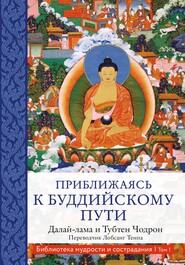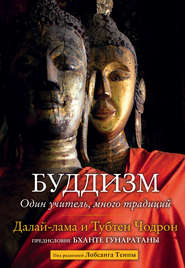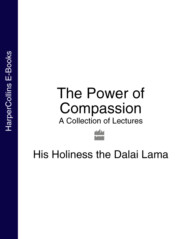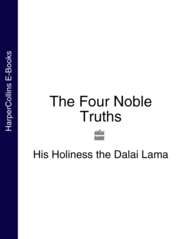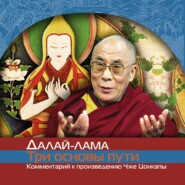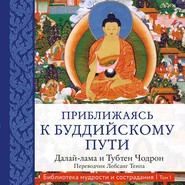По всем вопросам обращайтесь на: info@litportal.ru
(©) 2003-2024.
✖
The Dalai Lama’s Little Book of Wisdom
Автор
Год написания книги
2018
Настройки чтения
Размер шрифта
Высота строк
Поля
The Dalai Lama’s Little Book of Wisdom
Литагент HarperCollins
With characteristic humour and a down-to-earth approach to the Buddhist path, the Dalai Lama offers us an inspirational way to transform our hearts and minds and create the happiness we seek. He shows us how our state of mind, in terms of our attitudes and emotions, plays a crucial role in shaping the way we experience happiness and suffering.This ebook brings together His Holiness the Dalai Lama's thoughts on a variety of subjects, including contentment, compassion, dealing with anger and emotion, giving and receiving, transformation and facing death.
Table of Contents
Cover (#ub6ee907d-2ba3-5779-904c-af9f13e08844)
Title Page (#u24f994b2-7f39-5db1-bef6-46c2a3b0598a)
FOREWORD (#u8354a553-4f87-5ebb-b01e-efebafe30f62)
PREFACE (#u49097324-37c8-5e2e-823a-d52a37b73231)
PART ONE: CONTENTMENT, JOY AND LIVING WELL (#u4b51984a-bd9e-5862-aced-d414fc68de31)
PART TWO: FACING DEATH AND DYING (#u24470200-2a8f-5de3-9e4b-5ba76e360457)
PART THREE: DEALING WITH ANGER AND EMOTION (#uf761acd0-cb4a-54e3-ab6c-e66841100a80)
PART FOUR: GIVING AND RECEIVING (#u25b1a935-ed54-5a23-acec-d7be16713b6c)
PART FIVE: TRANSFORMING THE MIND (#litres_trial_promo)
PART SIX: TRANSFORMING THROUGH ALTRUISM (#litres_trial_promo)
PART SEVEN: TRANSFORMATION THROUGH INSIGHT (#litres_trial_promo)
PART EIGHT: VERSES ON TRANSFORMING THE MIND (#litres_trial_promo)
PART NINE: COMPASSION – THE BASIS FOR HUMAN HAPPINESS (#litres_trial_promo)
PART TEN: QUESTIONS AND ANSWERS (#litres_trial_promo)
Copyright (#litres_trial_promo)
About the Publisher (#litres_trial_promo)
FOREWORD (#ulink_4abcd3bb-9b23-5168-a69b-63cb9280597a)
The Dalai Lama’s Little Book of Wisdom is a collection of teachings given by His Holiness the Dalai Lama in a series of talks, lectures and question and answer sessions in the UK during 1993, 1996 and 1999.
His Holiness the Dalai Lama is the spiritual and temporal leader of the Tibetan people. In 1989 His Holiness the Dalai Lama was awarded the Nobel Peace Prize for his non-violent struggle for the liberation of Tibet. Since 1959 His Holiness has been living in exile in India. Tibet continues to be occupied by Communist China.
It is hoped that The Dalai Lama’s Little Book of Wisdom will bring His Holiness the Dalai Lama’s message about the importance of love, compassion, forgiveness, balanced attitudes and positive thinking to a wider audience.
The Office of Tibet would like to thank Jane Rasch and Cait Collins for transcribing His Holiness the Dalai Lama’s talks and lectures, and Dr Thupten Jinpa and Dominique Side for interpreting and editing His Holiness’ teachings into English.
PREFACE (#ulink_64f4458e-1929-532b-b33e-ab23b89f0420)
I am a Buddhist and my whole way of training is according to the Buddhist teaching or Buddha Dharma. Although I speak from my own experience, I feel that no one has the right to impose his or her beliefs on another person. I will not propose to you that my way is best. The decision is up to you. If you find some point which may be suitable for you, then you can carry out experiments for yourself. If you find that it is of no use, then you can discard it.
His Holiness the XIV Dalai Lama
PART ONE CONTENTMENT, JOY AND LIVING WELL (#ulink_27437100-6ce9-5511-83f3-17630bbb9e33)
The basic fact is that all sentient beings, particularly human beings, want happiness and do not want pain and suffering. On those grounds, we have every right to be happy and to use different methods or means to overcome suffering and to achieve happier lives. It is worthwhile to think seriously about the positive and negative consequences of these methods. You should be aware that there are differences between short-term interest and long-term interest and consequences – and the long-term interest is more important. Buddhists usually say that there is no absolute and that everything is relative. So we must judge according to the circumstances.
Our experiences and feelings are mainly related to our bodies and our minds. We know from our daily experience that mental happiness is beneficial. For instance, though two people may face the same kind of tragedy, one person may face it more easily than the other due to his or her mental attitude.
I believe that if someone really wants a happy life then it is very important to pursue both internal and external means; in other words, mental development and material development. One could also say ‘spiritual development’, but when I say ‘spiritual’ I do not necessarily mean any kind of religious faith. When I use the word ‘spiritual’ I mean basic human good qualities. These are: human affection, a sense of involvement, honesty, discipline and human intelligence properly guided by good motivation. We have all these qualities from birth; they do not come to us later in our lives.
As humans, we all have the same human potential, unless there is some sort of retarded brain function. The wonderful human brain is the source of our strength and the source of our future, provided we utilize it in the right direction. If we use the brilliant human mind in the wrong way, it is really a disaster.
I think human beings are the superior sentient beings on this planet. Humans have the potential not only to create happy lives for themselves, but also to help other beings. We have a natural creative ability and it is very important to realize this.
With the realization of one’s own potential and self-confidence in one’s ability, one can build a better world. According to my own experience, self-confidence is very important. That sort of confidence is not a blind one; it is an awareness of one’s own potential. On that basis, human beings can transform themselves by increasing the good qualities and reducing the negative qualities.
The fundamental teaching of the Buddha is his teaching on the Four Noble Truths: 1) That there is suffering; 2) that suffering has cause; 3) that there is cessation of suffering; and, 4) that there is a path to such freedom. The underlying principle of this teaching is the universal principle of causality. What becomes important in the understanding of this basic teaching is a genuine awareness of one’s own potentials and the need to utilize them to their fullest. Seen in this light, every human action becomes significant.
It is my belief that the human brain and basic human compassion are by nature in some kind of balance. Sometimes, when we grow up, we may neglect human affection and simply concentrate on the human brain, thus losing the balance. It is then that disasters and unwelcome things happen.
The smile is a very important feature of the human face. But because of human intelligence, even that good part of human nature can be used in the wrong way, such as sarcastic smiles or diplomatic smiles, which only serve to create suspicion. I feel that a genuine, affectionate smile is very important in our day-to-day lives. How one creates that smile largely depends on one’s own attitude. It is illogical to expect smiles from others if one does not smile oneself. Therefore, one can see that many things depend on one’s own behaviour.
The important thing is to use human intelligence and judgement, and to be mindful of the benefits for long-term and short-term happiness. Up to a certain point, the body itself is a good indicator. For instance, if some sort of food causes you discomfort one day, then later you will not want to consume that type of food. It seems that at a certain stage the body itself can tell us what is suitable for well-being and happiness and what is not.
Sometimes your intelligence may oppose your immediate desire because it knows the long-term consequences. Thus, the role of intelligence is to determine the positive and negative potential of an event or factor which could have both positive and negative results. It is the role of intelligence, with the full awareness that is provided by education, to judge and accordingly utilize the potential for one’s own benefit or well-being.
If we examine our mental world, we find that there are various mental factors which have both positive and negative aspects. For instance, we can look at two types which are quite similar: one is self-confidence and the other is conceit or pride. Both of them are similar in that they are uplifting states of mind which give you a certain degree of confidence and boldness. But conceit and pride tend to lead to more negative consequences, whereas self-confidence tends to lead to more positive consequences. I usually make a distinction between different types of ego. One type of ego is self-cherishing in order to get some benefit for itself, disregarding the rights of others. This is the negative ego. Another ego says, ‘I must be a good human being. I must serve. I must take full responsibility.’ That kind of strong feeling of ‘I’ or self opposes some of our negative emotions.
So there are two types of ego, and wisdom or intelligence makes a distinction. Similarly, we must be able to distinguish between genuine humility and a lack of confidence. One may mistake the two because both of these are sort of slightly humbling mental functions, but one is positive and the other is negative.
There is both positive and negative desire. For instance, the Mahayana Buddhist literature mentions two desires or two aspirations. One is the aspiration to be of benefit to all sentient beings and the other is the aspiration to attain fully the Enlightened state for that purpose. Without these two types of aspiration, the attainment of full Enlightenment is impossible. But there are also negative things which result from desire. The antidote to this negative desire is contentment. There are always extremes, but the middle way is the proper way.
The sense of contentment is a key factor for attaining happiness. Bodily health, material wealth and companions and friends are three factors for happiness. Contentment is the key that will determine the outcome of your relations with all three of these factors.
When our attitude towards our material possessions and wealth is not proper, it can lead to an extreme attachment towards such things as our property, houses and belongings. This can lead to an inability to feel contented. If that happens, then one will always remain in a state of dissatisfaction, always wanting more. In a way, one is then really poor, because the suffering of poverty is the suffering of wanting something and feeling the lack of it.
Now when we talk about objects of enjoyment or desire and material well-being, Buddhist literature mentions five types of objects of desire: form, sound, odours, tastes and tactile sensations. Whether or not these objects of enjoyment give rise to happiness, satisfaction and contentment, or conversely, give rise to suffering and dissatisfaction depends very much on how you apply your faculty of intelligence. Our behaviour in our daily lives is the key factor in determining whether these really produce genuine, long-lasting satisfaction or not. Much depends on our own attitude. And for this mental factor, motivation is the key thing.
In Buddhist literature, human life is seen as a favourable form of existence or rebirth. There are various factors that could complement the favourable existence as a human being, such as having a long life, good health, material possessions and eloquence so that one can relate to others in a more beneficial way. But whether or not these conditions lead to a more beneficial existence or a more harmful one depends very much on how you utilize them and whether or not you apply the faculty of intelligence.
Buddhist literature mentions practice of the Six Perfections. For instance, in the case of acquiring ma-terial possessions, according to Buddhism, generosity and the act of giving are seen as causes of wealth. But in order to practise generosity and giving successfully, one must first of all have a sound ethical discipline. And that ethical discipline can come about only if one has the ability to bear hardships when confronted with them. For that you also need a certain degree of joyful effort.
In order to practise the application of joyful effort successfully, one must have the ability to concentrate, to focus on events, actions or goals. That in turn depends on whether or not you have the ability to exercise your power of judgement, to judge between what is desirable and what is undesirable, what is negative and what is positive.
How do we go about implementing in our daily lives the principles which are stipulated in the practice of the Six Perfections? Buddhism recommends living one’s life within the ethical discipline of observance of what are known as the Ten Precepts, or Avoidance of the Ten Negative Actions. Most of the Negative Actions are common denominators of all religious traditions. They are seen as negative or undesirable for society in general, regardless of any religious point of view.
Good conduct is the way in which life becomes more meaningful, more constructive and more peaceful. For this, much depends on our own behaviour and our mental attitude.
Литагент HarperCollins
With characteristic humour and a down-to-earth approach to the Buddhist path, the Dalai Lama offers us an inspirational way to transform our hearts and minds and create the happiness we seek. He shows us how our state of mind, in terms of our attitudes and emotions, plays a crucial role in shaping the way we experience happiness and suffering.This ebook brings together His Holiness the Dalai Lama's thoughts on a variety of subjects, including contentment, compassion, dealing with anger and emotion, giving and receiving, transformation and facing death.
Table of Contents
Cover (#ub6ee907d-2ba3-5779-904c-af9f13e08844)
Title Page (#u24f994b2-7f39-5db1-bef6-46c2a3b0598a)
FOREWORD (#u8354a553-4f87-5ebb-b01e-efebafe30f62)
PREFACE (#u49097324-37c8-5e2e-823a-d52a37b73231)
PART ONE: CONTENTMENT, JOY AND LIVING WELL (#u4b51984a-bd9e-5862-aced-d414fc68de31)
PART TWO: FACING DEATH AND DYING (#u24470200-2a8f-5de3-9e4b-5ba76e360457)
PART THREE: DEALING WITH ANGER AND EMOTION (#uf761acd0-cb4a-54e3-ab6c-e66841100a80)
PART FOUR: GIVING AND RECEIVING (#u25b1a935-ed54-5a23-acec-d7be16713b6c)
PART FIVE: TRANSFORMING THE MIND (#litres_trial_promo)
PART SIX: TRANSFORMING THROUGH ALTRUISM (#litres_trial_promo)
PART SEVEN: TRANSFORMATION THROUGH INSIGHT (#litres_trial_promo)
PART EIGHT: VERSES ON TRANSFORMING THE MIND (#litres_trial_promo)
PART NINE: COMPASSION – THE BASIS FOR HUMAN HAPPINESS (#litres_trial_promo)
PART TEN: QUESTIONS AND ANSWERS (#litres_trial_promo)
Copyright (#litres_trial_promo)
About the Publisher (#litres_trial_promo)
FOREWORD (#ulink_4abcd3bb-9b23-5168-a69b-63cb9280597a)
The Dalai Lama’s Little Book of Wisdom is a collection of teachings given by His Holiness the Dalai Lama in a series of talks, lectures and question and answer sessions in the UK during 1993, 1996 and 1999.
His Holiness the Dalai Lama is the spiritual and temporal leader of the Tibetan people. In 1989 His Holiness the Dalai Lama was awarded the Nobel Peace Prize for his non-violent struggle for the liberation of Tibet. Since 1959 His Holiness has been living in exile in India. Tibet continues to be occupied by Communist China.
It is hoped that The Dalai Lama’s Little Book of Wisdom will bring His Holiness the Dalai Lama’s message about the importance of love, compassion, forgiveness, balanced attitudes and positive thinking to a wider audience.
The Office of Tibet would like to thank Jane Rasch and Cait Collins for transcribing His Holiness the Dalai Lama’s talks and lectures, and Dr Thupten Jinpa and Dominique Side for interpreting and editing His Holiness’ teachings into English.
PREFACE (#ulink_64f4458e-1929-532b-b33e-ab23b89f0420)
I am a Buddhist and my whole way of training is according to the Buddhist teaching or Buddha Dharma. Although I speak from my own experience, I feel that no one has the right to impose his or her beliefs on another person. I will not propose to you that my way is best. The decision is up to you. If you find some point which may be suitable for you, then you can carry out experiments for yourself. If you find that it is of no use, then you can discard it.
His Holiness the XIV Dalai Lama
PART ONE CONTENTMENT, JOY AND LIVING WELL (#ulink_27437100-6ce9-5511-83f3-17630bbb9e33)
The basic fact is that all sentient beings, particularly human beings, want happiness and do not want pain and suffering. On those grounds, we have every right to be happy and to use different methods or means to overcome suffering and to achieve happier lives. It is worthwhile to think seriously about the positive and negative consequences of these methods. You should be aware that there are differences between short-term interest and long-term interest and consequences – and the long-term interest is more important. Buddhists usually say that there is no absolute and that everything is relative. So we must judge according to the circumstances.
Our experiences and feelings are mainly related to our bodies and our minds. We know from our daily experience that mental happiness is beneficial. For instance, though two people may face the same kind of tragedy, one person may face it more easily than the other due to his or her mental attitude.
I believe that if someone really wants a happy life then it is very important to pursue both internal and external means; in other words, mental development and material development. One could also say ‘spiritual development’, but when I say ‘spiritual’ I do not necessarily mean any kind of religious faith. When I use the word ‘spiritual’ I mean basic human good qualities. These are: human affection, a sense of involvement, honesty, discipline and human intelligence properly guided by good motivation. We have all these qualities from birth; they do not come to us later in our lives.
As humans, we all have the same human potential, unless there is some sort of retarded brain function. The wonderful human brain is the source of our strength and the source of our future, provided we utilize it in the right direction. If we use the brilliant human mind in the wrong way, it is really a disaster.
I think human beings are the superior sentient beings on this planet. Humans have the potential not only to create happy lives for themselves, but also to help other beings. We have a natural creative ability and it is very important to realize this.
With the realization of one’s own potential and self-confidence in one’s ability, one can build a better world. According to my own experience, self-confidence is very important. That sort of confidence is not a blind one; it is an awareness of one’s own potential. On that basis, human beings can transform themselves by increasing the good qualities and reducing the negative qualities.
The fundamental teaching of the Buddha is his teaching on the Four Noble Truths: 1) That there is suffering; 2) that suffering has cause; 3) that there is cessation of suffering; and, 4) that there is a path to such freedom. The underlying principle of this teaching is the universal principle of causality. What becomes important in the understanding of this basic teaching is a genuine awareness of one’s own potentials and the need to utilize them to their fullest. Seen in this light, every human action becomes significant.
It is my belief that the human brain and basic human compassion are by nature in some kind of balance. Sometimes, when we grow up, we may neglect human affection and simply concentrate on the human brain, thus losing the balance. It is then that disasters and unwelcome things happen.
The smile is a very important feature of the human face. But because of human intelligence, even that good part of human nature can be used in the wrong way, such as sarcastic smiles or diplomatic smiles, which only serve to create suspicion. I feel that a genuine, affectionate smile is very important in our day-to-day lives. How one creates that smile largely depends on one’s own attitude. It is illogical to expect smiles from others if one does not smile oneself. Therefore, one can see that many things depend on one’s own behaviour.
The important thing is to use human intelligence and judgement, and to be mindful of the benefits for long-term and short-term happiness. Up to a certain point, the body itself is a good indicator. For instance, if some sort of food causes you discomfort one day, then later you will not want to consume that type of food. It seems that at a certain stage the body itself can tell us what is suitable for well-being and happiness and what is not.
Sometimes your intelligence may oppose your immediate desire because it knows the long-term consequences. Thus, the role of intelligence is to determine the positive and negative potential of an event or factor which could have both positive and negative results. It is the role of intelligence, with the full awareness that is provided by education, to judge and accordingly utilize the potential for one’s own benefit or well-being.
If we examine our mental world, we find that there are various mental factors which have both positive and negative aspects. For instance, we can look at two types which are quite similar: one is self-confidence and the other is conceit or pride. Both of them are similar in that they are uplifting states of mind which give you a certain degree of confidence and boldness. But conceit and pride tend to lead to more negative consequences, whereas self-confidence tends to lead to more positive consequences. I usually make a distinction between different types of ego. One type of ego is self-cherishing in order to get some benefit for itself, disregarding the rights of others. This is the negative ego. Another ego says, ‘I must be a good human being. I must serve. I must take full responsibility.’ That kind of strong feeling of ‘I’ or self opposes some of our negative emotions.
So there are two types of ego, and wisdom or intelligence makes a distinction. Similarly, we must be able to distinguish between genuine humility and a lack of confidence. One may mistake the two because both of these are sort of slightly humbling mental functions, but one is positive and the other is negative.
There is both positive and negative desire. For instance, the Mahayana Buddhist literature mentions two desires or two aspirations. One is the aspiration to be of benefit to all sentient beings and the other is the aspiration to attain fully the Enlightened state for that purpose. Without these two types of aspiration, the attainment of full Enlightenment is impossible. But there are also negative things which result from desire. The antidote to this negative desire is contentment. There are always extremes, but the middle way is the proper way.
The sense of contentment is a key factor for attaining happiness. Bodily health, material wealth and companions and friends are three factors for happiness. Contentment is the key that will determine the outcome of your relations with all three of these factors.
When our attitude towards our material possessions and wealth is not proper, it can lead to an extreme attachment towards such things as our property, houses and belongings. This can lead to an inability to feel contented. If that happens, then one will always remain in a state of dissatisfaction, always wanting more. In a way, one is then really poor, because the suffering of poverty is the suffering of wanting something and feeling the lack of it.
Now when we talk about objects of enjoyment or desire and material well-being, Buddhist literature mentions five types of objects of desire: form, sound, odours, tastes and tactile sensations. Whether or not these objects of enjoyment give rise to happiness, satisfaction and contentment, or conversely, give rise to suffering and dissatisfaction depends very much on how you apply your faculty of intelligence. Our behaviour in our daily lives is the key factor in determining whether these really produce genuine, long-lasting satisfaction or not. Much depends on our own attitude. And for this mental factor, motivation is the key thing.
In Buddhist literature, human life is seen as a favourable form of existence or rebirth. There are various factors that could complement the favourable existence as a human being, such as having a long life, good health, material possessions and eloquence so that one can relate to others in a more beneficial way. But whether or not these conditions lead to a more beneficial existence or a more harmful one depends very much on how you utilize them and whether or not you apply the faculty of intelligence.
Buddhist literature mentions practice of the Six Perfections. For instance, in the case of acquiring ma-terial possessions, according to Buddhism, generosity and the act of giving are seen as causes of wealth. But in order to practise generosity and giving successfully, one must first of all have a sound ethical discipline. And that ethical discipline can come about only if one has the ability to bear hardships when confronted with them. For that you also need a certain degree of joyful effort.
In order to practise the application of joyful effort successfully, one must have the ability to concentrate, to focus on events, actions or goals. That in turn depends on whether or not you have the ability to exercise your power of judgement, to judge between what is desirable and what is undesirable, what is negative and what is positive.
How do we go about implementing in our daily lives the principles which are stipulated in the practice of the Six Perfections? Buddhism recommends living one’s life within the ethical discipline of observance of what are known as the Ten Precepts, or Avoidance of the Ten Negative Actions. Most of the Negative Actions are common denominators of all religious traditions. They are seen as negative or undesirable for society in general, regardless of any religious point of view.
Good conduct is the way in which life becomes more meaningful, more constructive and more peaceful. For this, much depends on our own behaviour and our mental attitude.







